JI: What first drew you to cartooning?
LZ: I’ve been cartooning since I was little, before I started school. I remember entertaining myself by drawing on the living room door, I would draw everywhere! With my friends I would take part in cartooning competitions, we would challenge each other. Sometimes we would go looking for cartoonists in other areas to challenge us. It was through these little games that I came to cartooning, plus I would often go to the local library which had comics and political cartoons etc. I think all of this was part of my path to cartooning.
JI: So from very a very young age?
LZ: Yes absolutely.
JI: Where do you publish your cartoons?
LZ: Either on the website of my paper Gbich or in the paper itself. I should say that I launched a satirical paper called Gbich. At first, I published in a governmental newspaper, Fraternité de matin, where I illustrated a segment called le sourire du jour, for about 12 years, 13 years in fact, before creating my own paper and starting on the adventure of Gbich.
JI: Who is the audience of your cartoons?
LZ: From the youngest to the oldest. I’ve met parents who’ve told me their children learned to read through Gbich. I think we’ve played a certain role there. We sometimes have issues looking at politics and the like where it’s more mature people who read the paper. I’d say the audience is fairly broad, young people, young adults, adults.
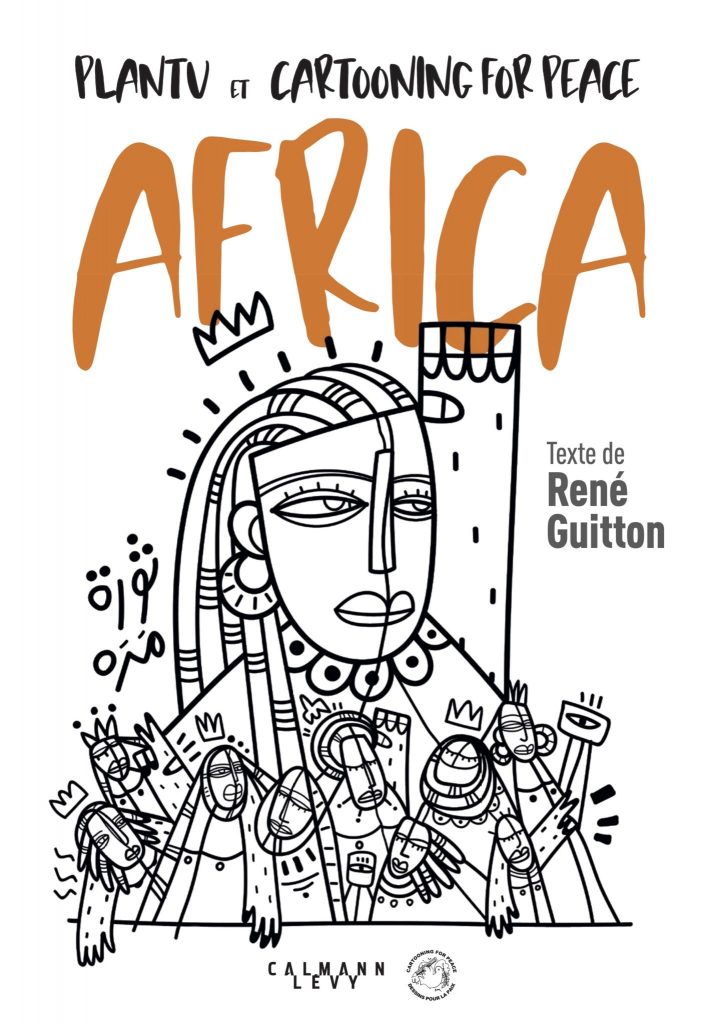
JI: What has been your experience of freedom of expression in Ivory Coast throughout your career? Have you encountered difficulties either in Ivory Coast or elsewhere?
LZ: I should say we’re quite lucky here in Ivory Coast. We haven’t had political difficulties. Well, sometimes there have been difficulties, but here in Ivory Coast most militants for political parties if they don’t like a cartoon either they insult you on social media or they call you directly to threaten you. Yes, that can happen. But in general, Ivory Coast has a culture of derisory humour and so political cartoons are very well accepted. This is why I say we haven’t really had political difficulties. Even at the top level, I’ve had the opportunity to meet President Gbagbo and President Ouattara who really liked what we were doing. So I think it’s more-or-less accepted. On the other hand, there are some African nations where cartoonists are quickly imprisoned but we’re not one of those countries. Here, we’re referred to as the ‘spoiled children’ of the press, because we are able to say things and the authorities don’t bother us too much, while there are others who say things and then hear from the authorities. So I think we are nevertheless very lucky to create cartoons because we are able to say things with a smile and also to provoke reflection.
JI: How would you describe the function of political cartoons in a word?
LZ: For me the purpose of political cartoons is raising awareness. Because we address head on social problems, political problems, we cut across all themes. This allows us to make use of the power to raise awareness and awaken consciences.
JI: Do you think your cartoons play a role on the international stage, beyond Ivory Coast?
LZ: When you make a cartoon you’re not thinking about where it might intervene. Maybe somewhere it could play a role, but usually when you’re creating a cartoon you’re thinking about the reality of your own country, but maybe. It’s possible. Sometimes between different countries there are similarities, and in these cases my cartoons may well have had a part to play.
JI: What is the importance of political cartooning in an African context?
LZ: You know, in Africa, most citizens are illiterate. So cartoons can help awaken consciences and they therefore have a very important role to play. We believe strongly that this particular media form can play a role. For instance, through the activities we run with Cartooning for Peace we go into schools and help raise awareness. The young people we work with start out by thinking cartoons are just fun, but after they see the message they contain and they begin to see how they can use cartoons to express themselves.
JI: In an interview in 2016 you talked about Gbich and said that people read the paper to unwind. How important is humour in cartoons, in your opinion?
LZ: Yes it’s true that it’s to help people unwind, but at the same time as I said there are two readings. The first reading is to amuse, to make people laugh or smile, but on second reading they take in the message. This is why I said that, because are some who leave out humour to privilege their point, but really we have the same goal albeit through a different method: to convey a message. A political party has an ideological stance, while we, at our paper, have an editorial stance, that via humour we convey our message. We believe this is the best method to convey our message and raise awareness.
JI: In light of all that, how can political cartoons encourage social cohesion?
LZ: Most papers here are aligned with a political party, this means their editorial stance is aligned with the party they support. At Gbich, we have no political allegiance. This allows us to be much freer with our critical gaze on all that happens and to critique it. I think political cartoons here afford us a critical distance and to express ourselves according to how we feel without any particular bias, to the left, right, or centre. So I think we’re really free to then reach the greatest number.
JI: You are currently president of Tache d’Encre. What do you do in this role and what is the organisation’s purpose?
LZ: I had the idea for Tache d’Encre when I launched Gbich, sinceI found it useful to bring cartoonists together in one organisation. Simply the aim is to help cartoonists work on their craft. Most cartoonists here have not received formal training so one aim is to train them. The role of Tache d’Encre is to provide a platform to discuss the craft and train cartoonists, but also to raise the profile of cartooning as a profession and of cartoons. Through the Coco Bulles festival that we started it enables encounters between cartoonists and to chart the evolution of cartooning. This is the overall objective of Tache d’Encre. Through Tache d’Encre each year we have a training programme through which we meet and train new cartoonists.
JI: Are these cartoonists just from Ivory Coast, or international?
LZ: Just from Ivory Coast. Tache d’Encre is an association for political cartoonists in Ivory Coast.
JI: What are the limitations of political cartoons? How do you overcome these limitations?
LZ: I don’t think there are limitations. When you draw cartoons without a particular bias, which is what we do at Gbich, there is more freedom and I don’t see any limitations. In principle there are no limits. Of course, there could be some elements where, for example, some subjects like nudity, which I wouldn’t do, it would be insulting. Religion, that’s possible, we at Gbich have sometimes produced cartoons on religious themes, and it hasn’t caused us any problems. It’s when you attack the Christian God or the Muslim God that upsets people because they don’t like when you talk about their divinity. But apart from that I don’t think there are real limits.
JI: What has the impact of COVID-19 been in Ivory Coast?
LZ: I think COVID-19 has, like everywhere, had a quite negative impact on what we do and on our economic activities. When the pandemic first started, we weren’t really handling it that well and the government had to prohibit certain activities including ours, we couldn’t sell our paper which has had a negative impact on our business. Beyond myself, it’s had an impact the media ecosystem since everyone is in lockdown meaning there are a lot of difficulties. Even now we are still feeling the harmful effects of COVID-19. France, which is a well-organised country, there have been funds put in place to help businesses to survive the pandemic.Here in Ivory Coast there have been funds available, but not enough and they are difficult to access.There have been many complaints about this but at this point I still haven’t been able to access these funds despite several attempts.
JI: What role can cartoonists play in the pandemic?
LZ: On our site you can see a number of cartoons dealing with the pandemic. Our role was one of awareness raising, around how the disease was spread. There were many many cartoons that we shared through our paper through social media etc. We’ve been very active. And our role was to raise awareness.
JI: What do you think the pedagogical value of cartooning is?
LZ: These days young people read less and less. With cartoons, they learn to better understand political issues and the country’s political reality. Political cartoons have play an important role here. Young people are more interested in entertainment but when we go to meet them and show them cartoons they play the game, they manage to dissect the message and the codes of political cartoons. So I think they are a good vehicle to help them understand little by little the reality of their country.
JI: What can we do to make political cartoons more attractive to young people? It sounds like the key thing for you is to physically take the cartoons to them.
LZ: Yes, absolutely, going out to meet them, as we do with our programme with Cartooning for Peace, but we also must use the media they are using. On Facebook, which is popular in Ivory Coast, we have pages we update regularly with political cartoons that help familiarise young people with cartoons. We are trying to put in place a practice which helps young people to take ownership of political cartoons and to be able to understand them.
JI: What is the future for cartoons in the age of the internet? Especially for young people.
LZ: We put our cartoons on social media. I don’t think this has had a negative impact. On the contrary, it allows us to highlight our cartoons and spread them further. We need to see the internet as an opportunity to popularise cartoons. Young people are very attached to the digital, so we must move towards the digital to continue publishing cartoons and raising awareness among young people. So I think this is a really good opportunity, except maybe for cartoonists.
JI: I see you have started to create animations. Do you see political cartooning and animation as distinct or are there similarities?
LZ: It is clear that they are distinct, but it is possible to create links and they can speak to each other. Up to this point we’ve only done cartoons that are fixed, still. Today, I think animated political cartoons are possible, and this is what I’m working on. Who knows. It was Mandela who said ‘It always seems impossible until it’s done’. I am certain that this can be interesting.
JI: My final question is what would you say to those who hope to make changes in society? Especially young people.
LZ: Today I think the world works generationally. Today it’s the militias and the presidents. But tomorrow it’s the young people who will take over. In order to take over they need to be prepared and equipped. So for young people, they really must believe in their abilities, that they follow the movements of the world, and little by little they will take control and replace those who are in power. At the moment those of my generation are in power they are the ones trying to impose their vision on the young, but then the young will be the ones to impose their vision on those who come after them. There is a gradual transmission of knowledge and ideas that then enables advancement. I think that’s how things work. For me whether young people believe in cartoonists or the government, they must believe in their potential and that’s how they’ll manage to change the world. The world is in constant evolution and young people really have a part to play because you at your age you’re already preparing to take over. It’s about adapting and moving the world forward.
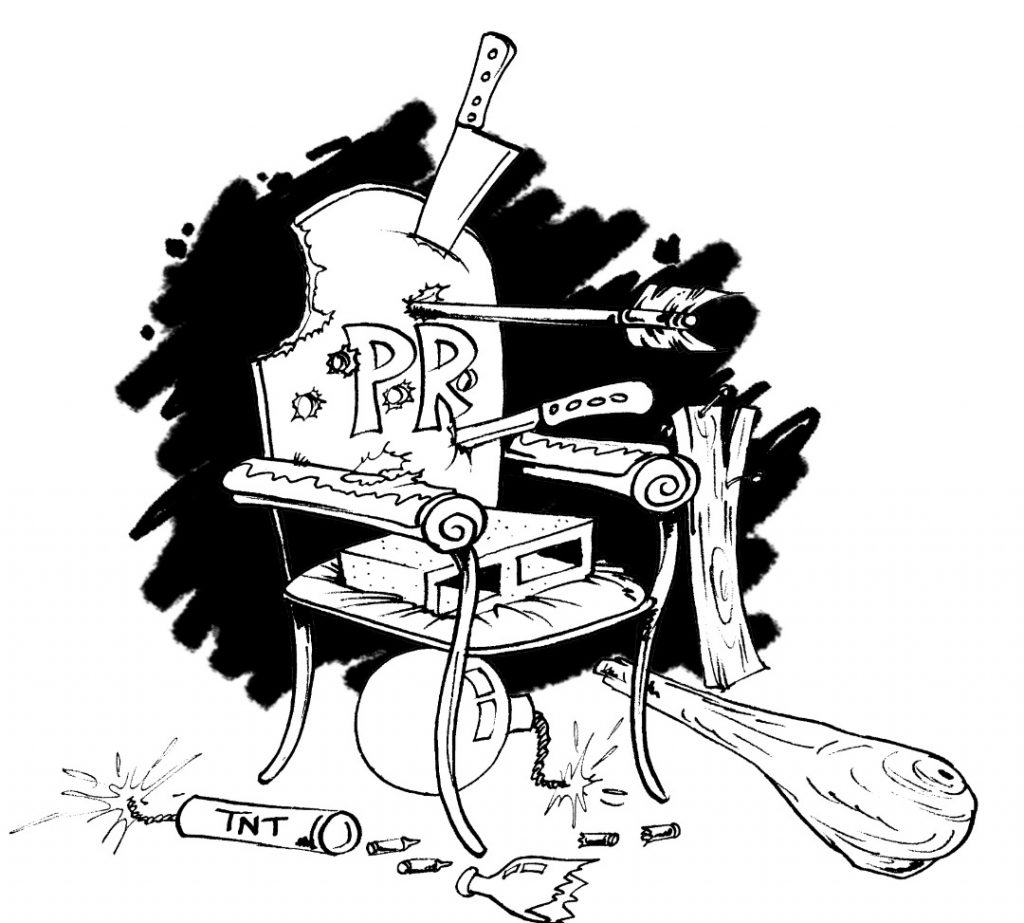
JI: You sent some cartoons to share. Would you be able to explain a little about what you were trying to achieve in these cartoons?
LZ: In this cartoon, ‘PR’ is the ‘President of the Republic’, it’s a presidential chair. In Africa it should be said that transitions tend to be violent. I wanted to translate in this cartoon the impact of these bullets and knives etc. Given what has happened in Haiti, this cartoon reflects that context too.
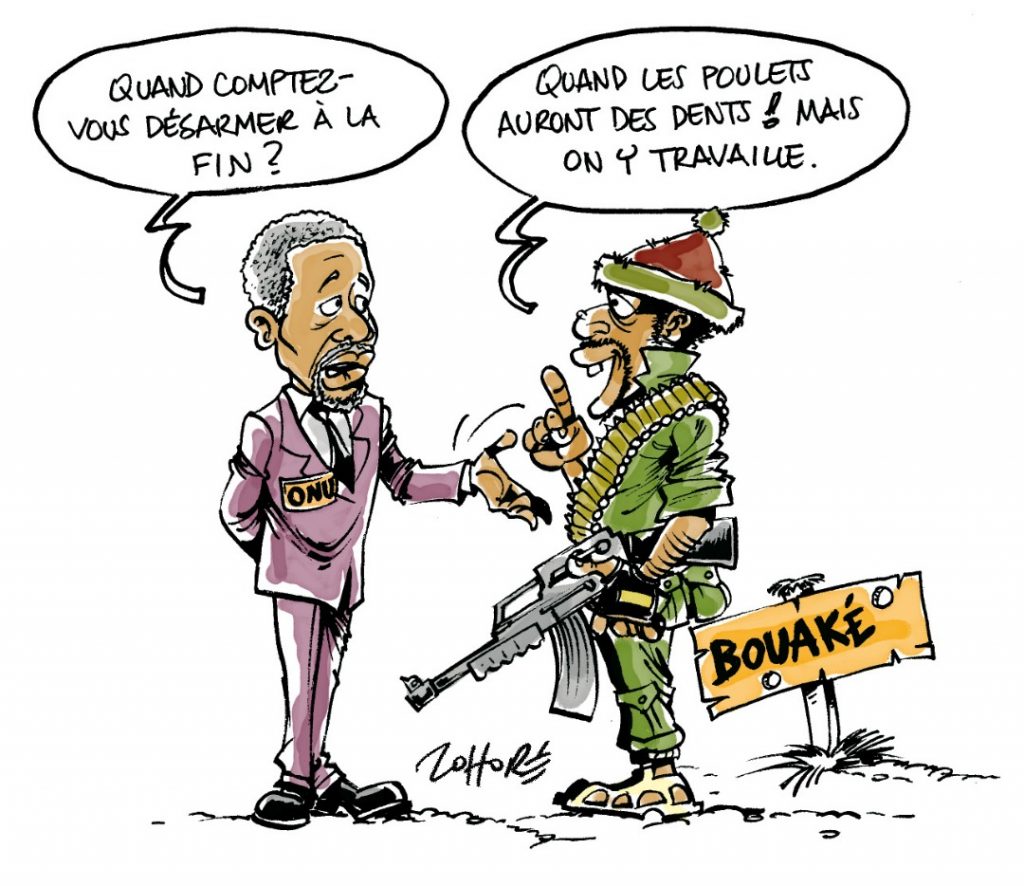
JI: I like this one and the phrase ‘quand les poulets auront des dents’ which is a new expression for me. In English we talk about pigs flying. What is the objective of this cartoon?
LZ: From 2002 to 2010, Ivory Coast was practically split in two because of a rebellion. The UN Secretary General visited to work towards disarmament, but this disarmament never took place. At each visit of the UN there was talk of disarmament, but it didn’t happen. And this is what I tried to get across in this cartoon.
JI: What I notice in this cartoon reinforces the presence of humour, just as you were talking about earlier. You’re dealing with a serious issue, but there is humour here all the same.
LZ: Yes absolutely, there is no need to be totally informed to understand what this cartoon is about.
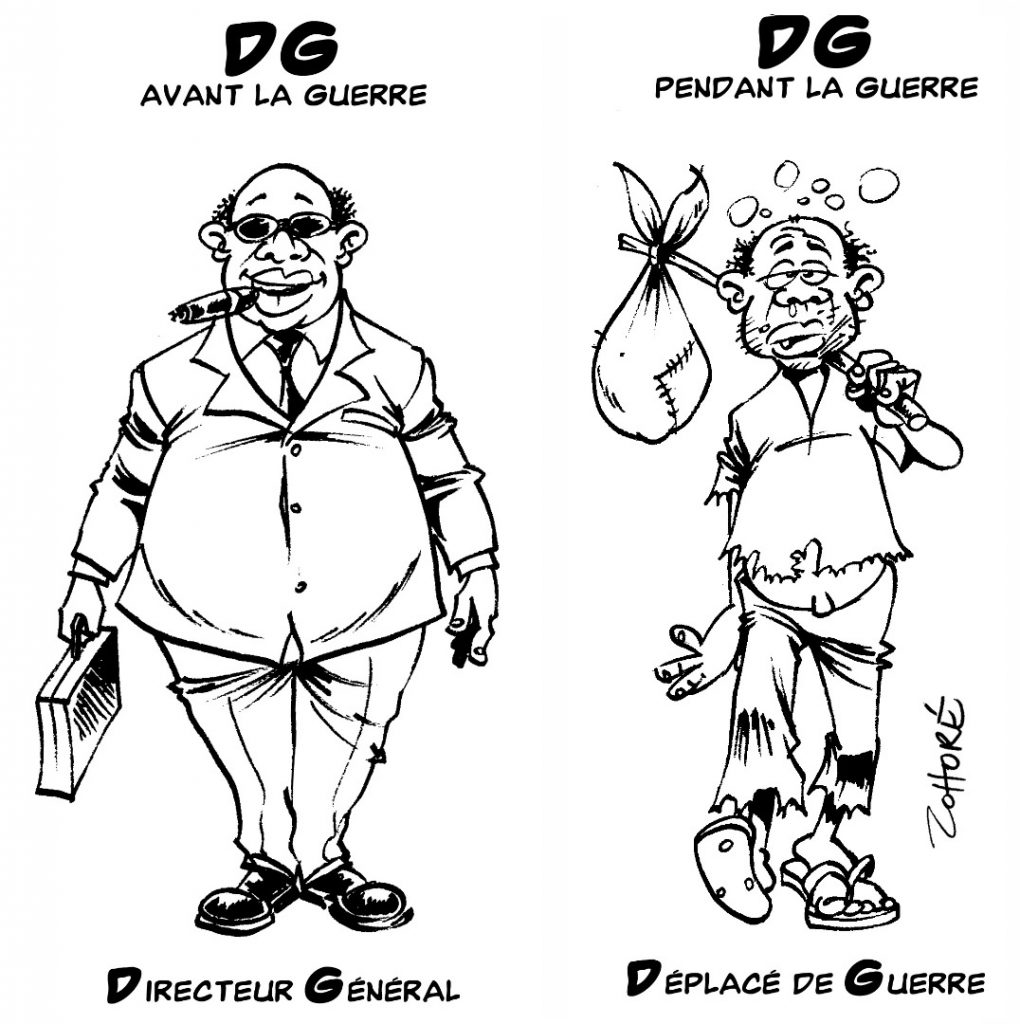
LZ: Now this one is Ivorian humour. We obviously have Director Generals (CEO), but during the rebellion we also called ‘DG’ those who had been displaced by the war. When their areas were invaded they lost everything, so from ‘DG’ to ‘DG’.
JI: So once again this really important idea of humour.
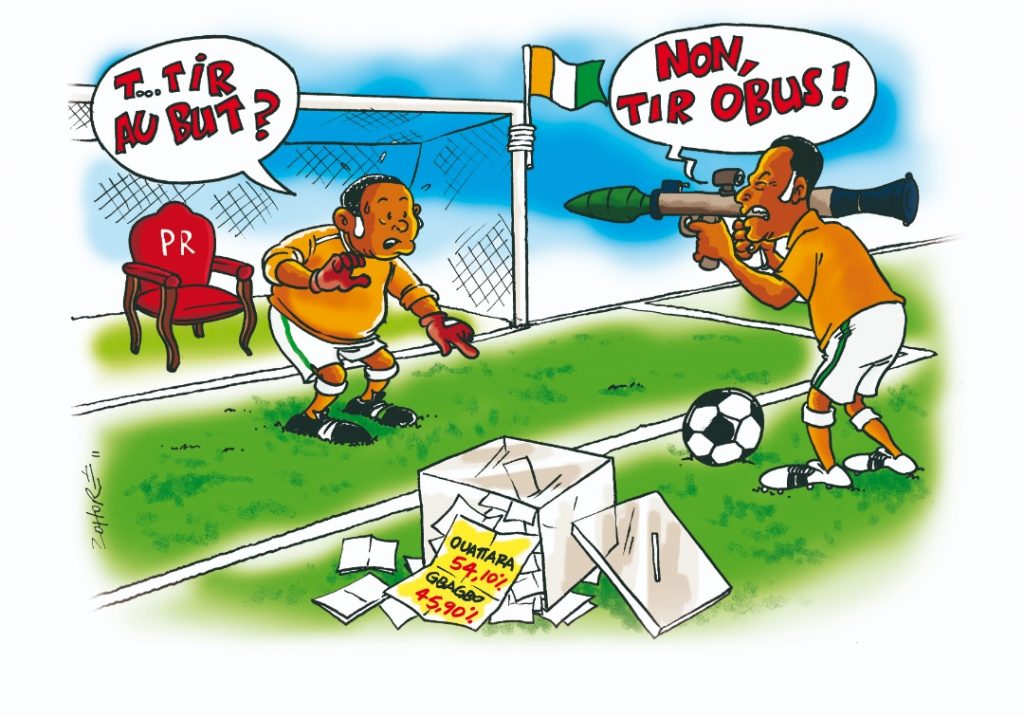
LZ: There was the election in 2010 between Gbagbo and Ouattara, and Gbagbo thought he had win. Ouattara had to resort to arms to depose Gbagbo. And this is the idea I wanted to put into this cartoon using the taunt in football ‘tir au but’ (shot on goal) and the play on words that I enjoyed with ‘tir obus’ (shell fire). And I think it works well in this cartoon.
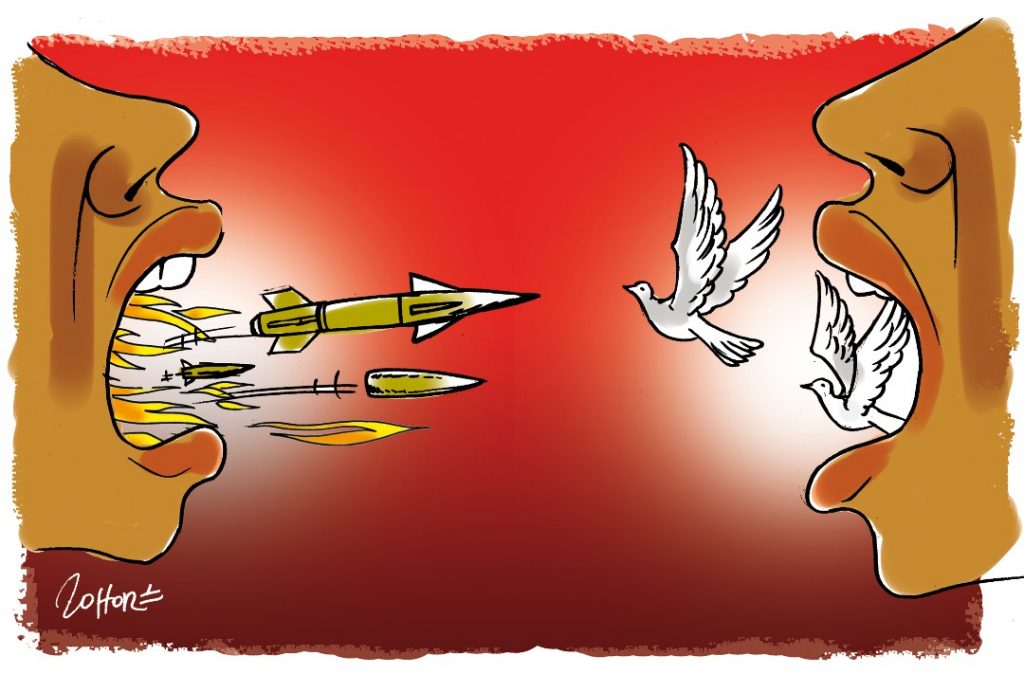
LZ: In this cartoon, very often you have on the one hand those calling for war and on the other side those promoting peace. Often instead of talking you start with war but at the end of the process there will be discussion. So why not start with that instead to reduce the number of dead bodies? So I created this cartoon to say that it must be the doves that win.
Interview conducted by Dr James Illingworth on 13 July 2021, as part of the GCRF-funded and AHRC-funded research on Covid in Cartoons, in collaboration with Cartooning for Peace and Shout Out UK.

 Subscribe to fl47's posts
Subscribe to fl47's posts